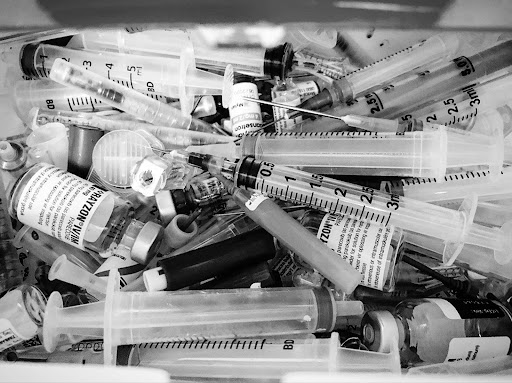
On Jan. 21, officers with California’s Merced unit confiscated 75 pounds of counterfeit Oxycodone pills believed to contain fentanyl with a street value worth an estimated $3 million, according to a statement from California Highway Patrol. The drugs were discovered by a K9 named Benny after an officer stopped a 2021 Volkswagen Tiguan for speeding. Once stopped the officer noticed “several factors and tradecraft” suggesting the driver was engaged in criminal activity, CHP said. The driver and a passenger were arrested for possession of narcotics for sale. Drug trafficking organizations typically distribute fentanyl by the kilogram, according to CHP. One kilogram of fentanyl has the potential to kill 500,000 people. The amount of fentanyl seized by CHP Merced could theoretically kill more than 17 million people.
Opioid Crisis in America
Fentanyl was created in the 1960s and approved by the Food and Drug Administration as a pain medication, mainly for surgery. In the late 1990s, pharmaceutical companies reassured the medical community that patients would not become addicted to opioid pain relievers and healthcare providers began to prescribe them at greater rates. Increased prescription of opioid medications led to widespread misuse of both prescription and non-prescription opioids before it became clear that these medications could indeed be highly addictive. Overdose deaths involving this highly addictive class of drugs have increased over six times since 1999, according to the Centers for Disease Control and Prevention. There were an estimated 100,306 drug overdose deaths from opioids in the U.S. from May 2020 through April 2021, an increase of 28.5 percent from the 78,056 deaths during the same period the year before.
Seniors Suffer From Opioid Crisis
One group which has been hit hard by the opioid crisis is older adults. While the synthetic forms of opioids like fentanyl have been behind more overdose deaths in recent years, with older adults “it often takes the form of prescription opioid pain medication misuse,” says Robert G. Sise, M.D., a psychiatrist specializing in addiction in Billings, Montana. From 1999 through 2019, 79,893 Americans 55 and older died due to an opioid overdose, according to a study published in JAMA Network Open. In 2019 alone, approximately 10,300 people 55 and older died from opioid overdoses, compared to just over 500 in 1999. Since the HHS declared a public health emergency and announced a “5-Point Strategy To Combat the Opioid Crisis,” there have been investigations into whether the drug distributors failed to withhold opioid shipments to pharmacies that submitted suspicious orders, and whether Johnson & Johnson misled patients and doctors about the addictive nature of opioid drugs.

Big Pharma Held Responsible for Opioid Crisis
Now, more than 400 cities and counties across California could soon receive payouts from a $2.3 billion settlement brokered with the major drug distributors over their role in the opioid crisis, according to California Attorney General Rob Bonta. The local governments that signed on will receive payments from the distributors in April of this year. Bonta said that of the $2 billion, a majority of funds will be used for opioid addiction treatment, education and other efforts. The collective payout in California stems from a $26 billion settlement negotiated with major drug distributors and manufacturers Cardinal, McKesson, AmerisourceBergen and Johnson & Johnson. The settlement, once finalized, would put an end to thousands of lawsuits nationwide that sought to hold the distributors and drugmakers to account for their alleged roles in promulgating the opioid epidemic.
“During this crisis, over one million Americans have died from an overdose … fathers found dead, alone on cold sidewalks. Mothers dead behind locked doors discovered by their children,” Bonta said. “Today’s announcement can’t bring back those lives. It can’t heal the devastating pain families still cope with. But it can prevent future death, future pain. It can provide our cities and our towns with the resources that they need to tackle this epidemic. We won’t stop holding folks accountable, whether it’s a big pharmaceutical company on Wall Street or a fentanyl dealer on Main Street.”
Addiction is something that has touched everyone in America in one way or another. If you, or someone you know, needs help with addiction please visit one of the following sites for resources:
US Department of Substance Abuse and Mental Health
Written by: Erinn Malloy

